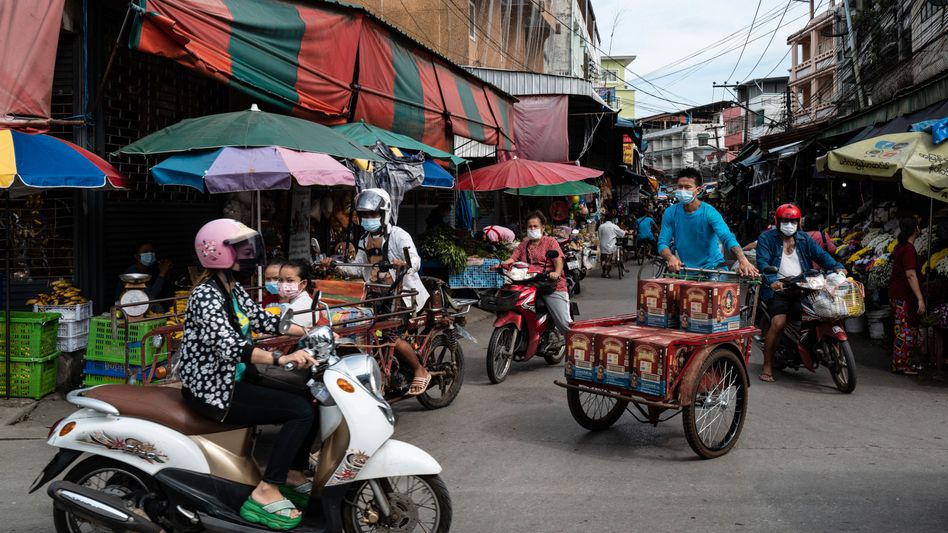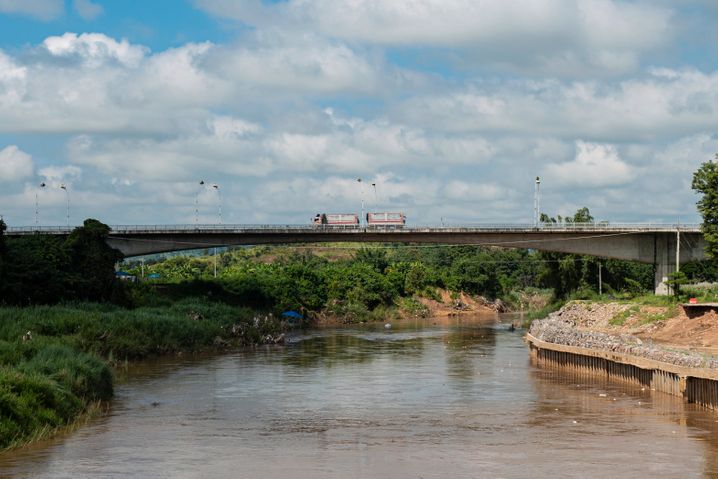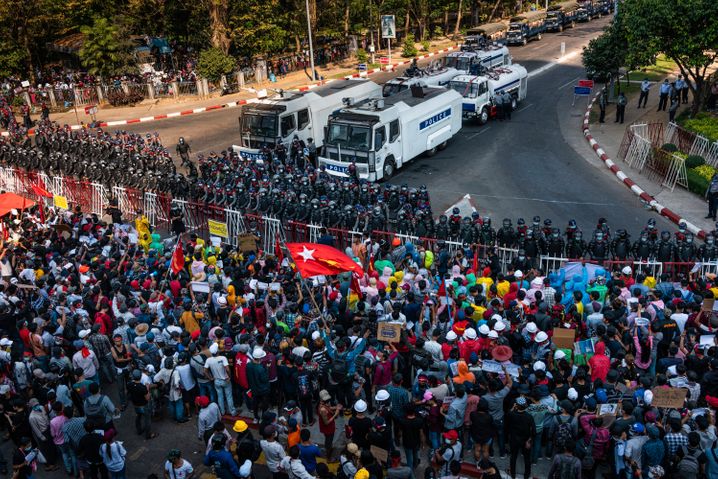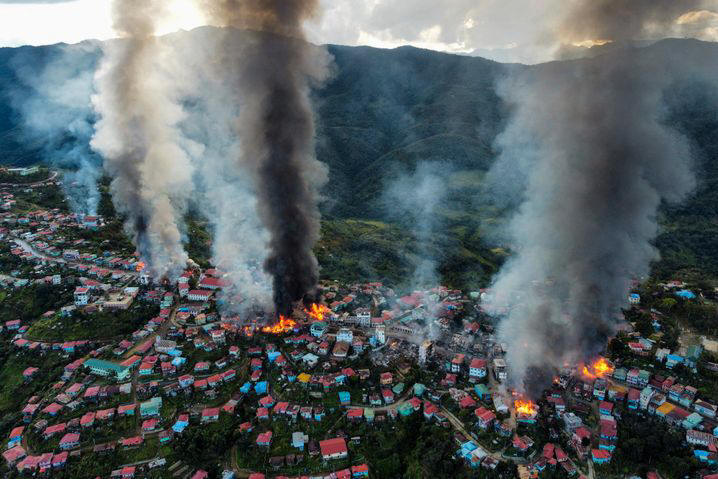www.aljazeerah.info
News, December 2021
Archives
Mission & Name
Conflict Terminology
Editorials
Gaza Holocaust
Gulf War
Isdood
Islam
News
News Photos
Opinion Editorials
US Foreign Policy (Dr. El-Najjar's Articles)
www.aljazeerah.info
|
Editorial Note: The following news reports are summaries from original sources. They may also include corrections of Arabic names and political terminology. Comments are in parentheses. |
Thai Border Town, Mae Sot, Becoming a Hotbed of Resistance to Myanmar's Military Junta
Der Spiegel, December 12, 2021
 |
 |
| A street scene in Mae Sot, Thailand, December 10, 2021 | One of two border crossings in Mae Sot, on the other side is the Myanmar city of Myawaddy, December 10, 2021 |
 |
 |
| Shortly after the putsch, protesters confront the military in Yangon, December 10, 2021 | In late October, several homes went up in flames in Thantlang, in the Myanmar region of Chin State, reportedly the result of military air strikes, December 12, 2021 |
City of Warriors: Resistance Across the Border to the Myanmar Military Junta
A Thai town on the border to Myanmar has become a hotbed of resistance to the military junta in Yangon. Many believe this could be the last chance to save the country from dictatorship.
By Maria Stöhr in Mae Sot,
For our Global Societies project, reporters around the world will be writing about societal problems, sustainability and development in Asia, Africa, Latin America and Europe. The series will include features, analyses, photo essays, videos and podcasts looking behind the curtain of globalization. The project is generously funded by the Bill & Melinda Gates Foundation.
The blood seeped from the label in the back around the collar to the top button, before soaking down the right breast. There are also three or four spots where the blood spattered, perhaps from the last hard blow to the head, the one that cracked Min Nyoís skull.
The blood is dry. But it will forever bear witness to the violence that spilled it.
Min Nyo is now holding the shirt in his lap, but he was wearing it on the morning of March 10, 2021, in Pyay, a small town in the Bago region of Myanmar. He had been out on the streets filming the protests against the military, simply doing his job as a television journalist. But he was apprehended and stood up against a wall at the police station with a plastic bag over his head before being beaten and locked up.
It is a gray, short-sleeved shirt with blue-and-white stripes in some spots. Size small. Now that he is in safety in a hotel room in the Thai border town of Mae Sot, he can speak openly about the seven months he spent in prison in Myanmar. As he speaks, he keeps grabbing the back of his neck with his hand, almost as though he is trying to massage away the memory of the pain.
Min Nyo agreed to have his real name used for this story and to show his face. But he ruled out a meeting with his family Ė his wife, two sons and one daughter Ė and also requested that his place of residence be omitted. "They wouldnít hesitate to kill us," he says. Min Nyo managed to escape the clutches of the junta, but the fear is still present.
Myanmar, his homeland, lies just across the river. He can see it. And he canít forget it.
The dusty roads of Mae Sot, located in northwestern Thailand, are lined with three-story buildings, shops, car repair shops and apartments. Around 50,000 citizens of Thailand live here, along with a population of refugees and migrants from Myanmar that is estimated to be twice as large.
The main market, where papayas, poultry and fresh tilapia are on offer, is divided into a Thai area and a Burmese area. Thanaka is available on the tables belonging to many of the Burmese vendors, a yellowish paste made from ground up bark that is used by men and women in Myanmar as protection against the sun.
Mae Sot has always been a place where opposition activists from Myanmar end up, along with those from Thailandís poorer neighbor who are looking for a better life and find jobs in hotels, restaurants, kitchens and factories or as taxi drivers.
There are two border crossings here, broad streets full of trucks bringing goods from Thailand into Myanmar and from Myanmar to Thailand Ė construction materials, foodstuffs, smuggled drugs, jade and wood. And there is also the river, which has never been much of a barrier. Farmers and fishermen cross the waterway every day in their small boats.
On Feb. 1, 2021, the military junta in Myanmar overthrew the government and returned to power, ending several years during which it often looked like things were looking up for the country. The military arrested the de-facto head of government, Aung San Suu Kyi, an icon for many.
Since then, Mae Sot has become a place of refuge for those escaping Myanmar, including the persecuted and those who have been released from prison. They reunite on the Thai side of the border and, over milk-tea, talk about their broken dreams and their hopes of asylum in the United States, Canada or Europe. But they are also laying plans for armed resistance. Mae Sot has become a city full of warriors.
The United Nations and other organizations maintain safehouses in Mae Sot where refugees from Myanmar can live for a time. The small apartments are dispersed throughout the city and it is from these shelters that people from Myanmar file their asylum applications, entire families in many cases. During the day, you can meet with them in the cafťs in the city center, where Burmese tea is served along with fried roti with condensed milk and "laphet thoke," a salad made of fermented tea leaves, listed on the menus like a silent reminder of home.
Up until February, it looked as though Myanmar, with its 55 million inhabitants, was moving toward a future of more openness and democracy after several decades of changing military dictatorships, civil wars and expulsions. By the middle of the 2010s, most people in the country had access to the internet following many years of censorship. University students would spend a semester studying abroad; they grew up with smartphones and were members of social networks. Social and political freedoms, they came to understand, were crucial to their lives.
Now, though, power is once again in the hands of men who have no use for democracy and who only understand the language of violence. Since the putsch, the military junta has arrested 10,000 people and, according to the Assistance Association for Political Prisoners, killed more than a thousand of them. The military is made up of 300,000 soldiers and is armed by Russia and China.
Early on, people in Yangon and other cities would protest from their balconies, beating on pots in the evening and staging peaceful demonstrations. But then, the military shot a 20-year-old protester in the head and, not long later, a six-year-old girl who was trying to flee into the safety of her fatherís embrace. Many say that was the moment when the erstwhile peaceful resistance became a violent struggle.
Smuggling Weapons to Myanmar
In another hotel room not far from Mae Sot, in a neighboring town that will not be named, a woman who asks to be called Thinzar says: "We are fighting against the junta. We donít have a choice. We will keep fighting until we win."
In her mid-20s, Thinzar studied business in Yangon and began collecting art, and she also does a bit of painting herself on occasion. An acrylic palette and a small canvas lie on the shelf behind her, with the beginnings of a painting on it: abstract black figures with spots of red on them. Thinzar takes a drag from her e-cigarette.
Thinzarís parents were active in periods of political unrest in 1988 and 2007 and both have spent several stints in prison. They never, though, ceased standing up for their rights. Now, itís Thinzarís turn.
Her role is smuggling weapons and munitions from Thailand to the underground fighters still in Myanmar. A former engineer who fled to Thailand from Yangon builds remote detonators that Thinzar then sends across the border into Myanmar. The rebels use them to blow up military vehicles and soldiers belonging to the junta. "To kill the trash,Ē as she says.
Thinzar says it grew too dangerous for her to remain in Myanmar, saying that her name has been blacklisted. She says that before leaving, she saw fellow fighters die before her eyes and she helped carry them from the streets. She refuses, though, to leave her country in the lurch.
Since the putsch, an army of guerilla fighters has formed in Myanmar. According to the International Crisis Group, it is made up of hundreds of armed fighters belonging to the Peopleís Defense Forces (PDFs). In the jungles and in the areas belonging to ethnic minorities in Myanmar, they are now training for the war against their countryís army. Students, young men and women, professors from the cities: They are all now crawling through the mud of the jungle, building makeshift shelters and training with weapons.
DER SPIEGEL was able to see photos of the training camps. Many of those who have joined the fight, no matter what the price they may ultimately have to pay, were not politically active before. Now, though, they are united in the belief that they are part of the last generation that can prevent Myanmar from remaining a military dictatorship forever. But what can this group of amateurs expect to accomplish in this battle against the well-equipped military?
The weapons that Thinzar is smuggling into Myanmar will very likely kill people, and some of the victims may be civilians.
"If we want to destroy the system, we have to accept that," Thinzar says. "We are doing what we have to do." When asked if the coup has changed her as a person, she says: "Of course this coup has changed me. A year ago, I wanted to open an art gallery or start a book club. Now, I am helping to kill people."
But she does admit that she's afraid. "Iím human. Iím young. Iím afraid of dying. It could be that Iíll die. And if that happens, somebody else will stand up and continue my work. Myanmar must be free. It has to work this time. We will win."
"It could be that Iíll die. And if that happens, somebody else will stand up and continue my work. Myanmar must be free. It has to work this time. We will win."
Thinzar, who smuggles weapons into Myanmar
Thinzarís family has been granted asylum in a different country, far away. But she herself intends to remain in Thailand, within sight of her home country. She says she has had trouble sleeping for the last six months and takes two different kinds of sleeping pills to try to turn off her brain at night.
Min Nyo, the man who holds onto his bloody shirt like a piece of evidence, says that he would have remained politically active in Myanmar if he didnít have a family. He left the country, he says, for his family. Now, he is doing whatever he can from across the border to support the people still living in Myanmar Ė his friends and his former co-workers. He supplies them with information, listens to their fears and asks what they need.
Thinzar and Min Nyo are just two of the hundreds of people stranded in Mae Sot. They are in safety, and could easily move somewhere else where they wouldnít have to see their country across the river every day. They could try to start a new life somewhere else and finally be free. Ever since obtaining independence from the British in the 1960s, there has hardly been anything resembling political peace in Myanmar. The country has been continually rocked by ethnic conflict, fights over semi-autonomous regions and military dictatorships. Why do Thinzar, Min Nyo and the others believe that the story might be a different one this time around?
"Thatís the wrong question," says Thinzar. "I didnít choose this fate. The military took our future away from us."
Min Nyo agrees. "They treat us like animals. They didnít think that we would stand up for ourselves like this. That freedom would mean so much to us. But it is worth everything."
And then they say virtually the same thing, from their different locations in and around Mae Sot. That it will take a lot of time and a lot of strength. But that the people of Myanmar will win in the end. And that they wonít back down.
City of Warriors: Resistance Across the Border to the Myanmar Military Junta - DER SPIEGEL
***
Share the link of this article with your facebook friendsFair Use Notice
This site contains copyrighted material the
use of which has not always been specifically authorized by the copyright
owner. We are making such material available in our efforts to advance
understanding of environmental, political, human rights, economic,
democracy, scientific, and social justice issues, etc. We believe this
constitutes a 'fair use' of any such copyrighted material as provided for
in section 107 of the US Copyright Law. In accordance with Title 17 U.S.C.
Section 107, the material on this site is
distributed without profit to those
who have expressed a prior interest in receiving the included information
for research and educational purposes. For more information go to: http://www.law.cornell.edu/uscode/17/107.shtml.
If you wish to use copyrighted material from this site for purposes of
your own that go beyond 'fair use', you must obtain permission from the
copyright owner.
|
|
|
|
||
|
||||||


